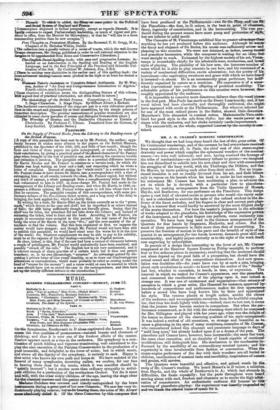MR. J. B. CRAMER'S MORNING PERFORMANCE:
We thought that we had long since heard the last of this great artist. Of his Continental wanderings, and of the caresses he had everywhere-received, from musicians—above all, in. Paris, the chief seat of that steam-engine dexterity and power which supplies the ephemeral wonders of the musical season—we were well informed; and now, having received the homage of the tribe of mechanicians—an involuntary tribute to genius—we imagined him not disinclined to subside into his arm-chair and view with amusement the straggles of the busy world, with the Thalbergs, the Dohlers, and the. De Meyers, by turns pushing each other from their stools. But an impas- sioned musician is not so readily divorced- from his art, and filids leisure only to repose on his laurels when his head is under its last canopy. In his retirement Mr. Cramer has been meditating a plan to advance the art to which he is devoted, with a particular view to pianoforte- players, by making arrangements from the Violin Quartets of Mozart,. Haydn, and Beethoven, for one performer on the Pianoforte. This design opens a vast field of elevated music to persons who would else rarely enter it; and is calculated to exercise the taste of the refined student in the de- livery of the finest melodies, and his fingers in clear and correct part-play- ing, in a manner that would hardly be answered by the most diligent study of the scores themselves. For here the master's judgment in the selection of works adapted to the pianoforte, his knowledge of the :expressive powers. of the instrument, and of what fingers can perform, come eminently into operation. We have been long used to the German arrangements of the Quartets for four hands by Stegmann, Mockwitz, and others. But the merit of these performances is little more than that of transcribing. To preserve the freedom of motion in the parts and the breadth of style of the quartet in an arrangement for two hands, however demands great skill and musicianship; and highly piques curiosity as to the eight of the work itsel4 now engraving by subscription.
In pursuit of a design thus interesting to the lover of art, Mr. Cramer reappeared at the Hanover Square. Rooms on Fridarsennight, to perform` four or five arduous pieces in succession; resolving that the amateurs should,'' not alone depend on the good faith of a prospectus, but should have the actual sound and-effect of the compositions themselves. And now specu- lation was doubtless rife—for years have• run by at such a rate,• bringing about such revolutions in music—to know what the author of the " Studio" had lost, whether in execution, in touch, in tone, or expression. The interval in which we waited for Cramer's appearance, saw the: pianoforte, and connected, the recollections of his playing upon it, was, indeed a, strange one. It was one of excitement and expeetation,--that estuary or sensation-in which a- great artist, like Hummel -for instance, approved bye hundreds of compositions and performances, makes his first appearances before a crowd who have long known him by fame and appretisted• his style. The veteran pianist at length enters, amidst the cheers— of the audience; and we congratulate ourselves, from his healthful complex ion, that time has dealt lightly with him,—indeed; since we last met, it seems that the juniors have become seniors in comparison. But when the per- formance commenced, as-it did with the charming duet which he composite - for Mrs. Billington and played with her years ago, what was the delight of, the hearer to discover all the charming,qualities of- his style. unimpaired!. It was indeed a revival of old sensations, so strange and beautiful- as to, cause a.giistening the. eyes of many musicians, comrades of Mr. Cramer,; who remembered indeed this eloquent and passionate language in -days or " surd lang syne," but already looked upon it as a dream of the past. The pianoforte and Cramer have, however, been inseparable; the same fine tone, the same clear execution, and an elasticity of touch capable of continual modifications, still distinguielr him. His mechanism is the mechanism in- fluenced by the sensibility of an extraordinary-musical nature-' and his, superiority is thus invulnerable from fashion or convention. When the steam-engine performers of the day with their wonders are all buried hr oblivion, recollections of musical taste and sensibility, inspirationsof nature, and genius, will survive. The Quartets were beautiful and effective, and gained much by the. unity of Mr. Cramer's reading. We heard Mozart's in D minor, a selection from Haydn, and the whole of Beethoven's in AI which- last abounds in. difficulties, the finale especially: but the parts throughout were heard moving about with such freedom and clearness as to excite the high admi- ration of connoisseurs. An enthusiastic- audience did- honour to this- morning of pianoforte-playing: the experiment was- heartily responded tej andgwe-thank the altered times of music for it.


























 Previous page
Previous page